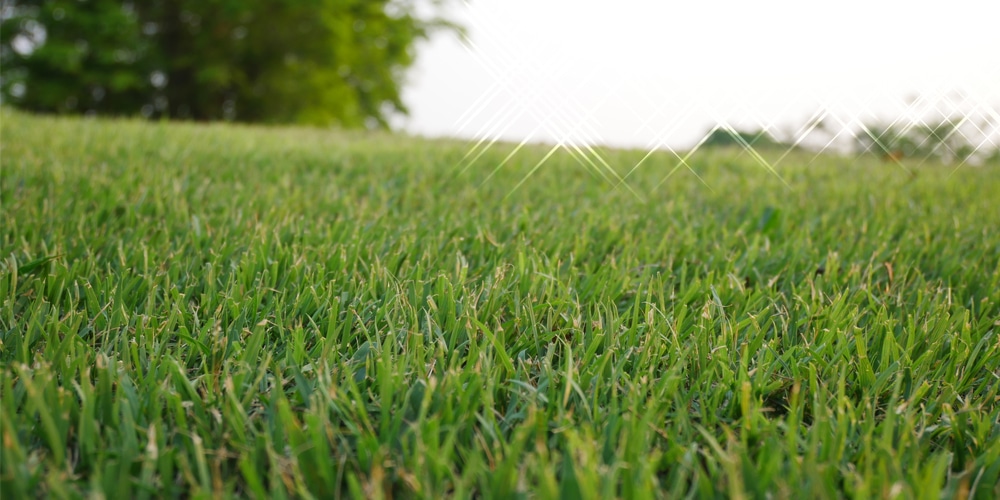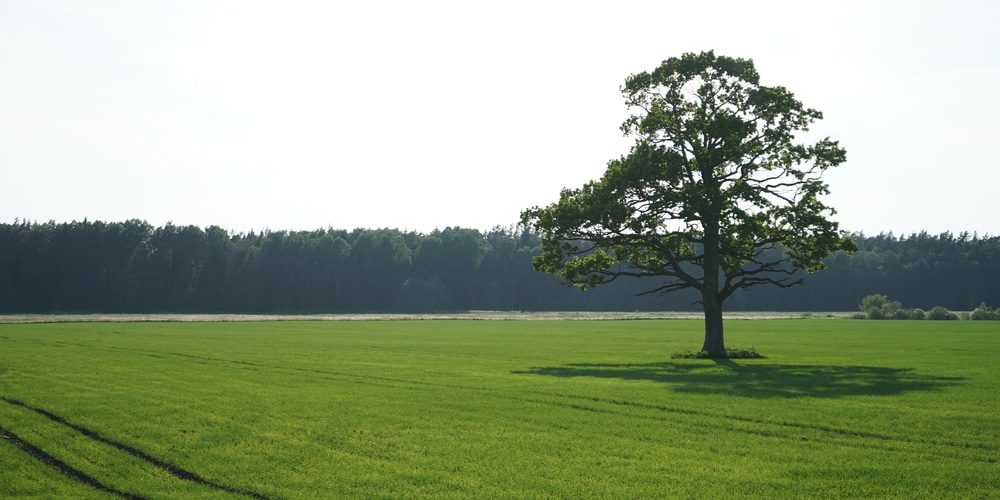Grass Varieties for Sports Fields: What Makes The Cut
When selecting grass seed for sports fields, your choices impact the field’s durability, maintenance requirements, and suitability for different climates.
- Cool-season grasses thrive in northern regions with colder temperatures:
- Kentucky bluegrass: Offers remarkable recovery from wear and boasts a rich color. It’s a common pick for its resilience and adaptability.
- Perennial ryegrass: Known for rapid germination and high traffic tolerance, making it suitable for fields in use all-year-round.
- Tall fescue: Excels in both drought and heat stress, making it a robust candidate for sports fields. It performs well in sandy soils, commonly found in infields and outfields.
- Warm-season grasses are your go-to in southern states due to their heat endurance:
- Bermudagrass: A champion in durability and heat tolerance, this is the workhorse for fields that endure extreme temperatures and heavy use.
When you consider grass seed for your field, factor in soil type, local climate, and expected usage.
Each grass variety requires a specific maintenance regime, from watering to mowing frequencies, that will keep your field in peak condition.
Soil and Climate Considerations for Optimal Growth
Selecting the appropriate grass seed for your sports field is not just about the look; it’s about matching to the soil type and climate you’re dealing with.
Soil Types and Nutrition for Grass
Different grass species thrive in varying soil conditions. Your choice of grass impacts not only the aesthetics but also the durability of the playing surface.
- Sandy Soils: Quick drainage but may require more frequent watering and fertilization.
- Clay Soils: Retain water and nutrients but have poor drainage, leading to potential turf damage.
- Loamy Soils: Ideal for most grass types; offer a balance of drainage and nutrient retention.
Key Nutrients Required:
- Nitrogen (N): For leaf growth and vibrant green color.
- Phosphorus (P): Root development and energy transfer.
- Potassium (K): Overall health and disease resistance.
To ensure robust growth, conduct a soil test to tailor the fertilization plan to your field’s specific needs.
Climate Impact on Grass Selection
Your local climate dictates the grass species that will best survive and flourish. Here’s what you should zero in on when choosing seed:
- Warm Climates: Bermuda grass excels here due to its heat tolerance and speedy recovery.
- Cool Climates: Opt for Species like Kentucky bluegrass, tall fescue, or perennial ryegrass which maintain a lush turf in lower temperatures.
- Transition Zones: Tall fescue is a versatile option that adapts well to varying temperatures.
Maintenance and Upkeep of Sports Field Turf

Proper maintenance is crucial for the health and longevity of sports field turf. Issues like compacted soil and thatch build-up can hinder turf growth and playability.
Implementing a rigorous upkeep routine ensures your field can withstand heavy use throughout the sports seasons.
Irrigation and Water Management
Your sports field requires a precise watering strategy to maintain its condition:
- Quantify Water Needs: Different grass types have unique water requirements. Adequate hydration is essential for growth and repair.
- Efficient Irrigation Systems: Employ irrigation systems, like sprinklers or subsurface methods, to provide uniform coverage and conserve water.
Tips for enhancing water management:
- Monitor Weather Reports: Adjust irrigation in response to rainfall.
- Utilize Soil Moisture Sensors: They ensure the field receives balanced hydration.
Mowing and Aeration Best Practices
Mowing and aeration influence the turf’s resilience:
- Regular Mowing: It maintains grass health and density. Adhere to the one-third rule, never removing more than a third of the grass blade to prevent stress.
- Seasonal Aeration: Reduces soil compaction, allowing better nutrient uptake and root growth.
Essential aeration considerations:
- Frequency: Aerating twice a year, in spring and fall, is usually sufficient.
- Equipment Choice: Use hollow tine or solid tine aerators based on turf needs.
Fertilization and Pest Control
Fertilization and pest control are vital for robust sports turf:
- Balanced Fertilization: Implement a schedule based on grass type, climate, and soil testing results to supply essential nutrients.
- Integrated Pest Management (IPM): Monitor and manage pests using eco-friendly practices.
Steps for effective turf management:
- Soil Testing: Assess soil nutrient levels every 1-2 years.
- Choose Products Wisely: Opt for slow-release fertilizers and target specific pests with appropriate control methods.
For detailed guidance on sports field turf management, the Sports Turf Managers Association offers resources tailored for athletic directors, school boards, and municipalities.
Innovations in Grass Seed Technology
The field of grass seed technology is rapidly advancing, with new innovations focusing on durability and environmental sustainability. These developments are reshaping the way sports fields are established and maintained.
Hybrid Varieties and Genetic Improvements
- Trait Selection: Scientists are focusing on specific traits to breed grasses that stand up to the intense usage seen on sports fields. For instance, varieties are now available that offer enhanced wear tolerance and faster recovery rates after extensive play.
- Genetic Advancements:
- Disease Resistance: Newer grass seeds display improved resistance to common turf diseases, reducing the need for chemical treatments.
- Drought Tolerance: Grass varieties are being developed to withstand periods of low water availability, which is crucial in regions with water use restrictions.
Sustainable Practices in Seed Production
- Eco-friendly Cultivation: Seed producers are incorporating practices that reduce their carbon footprint, such as limiting the use of non-renewable resources during cultivation.
- Biodiversity: Emphasizes the creation of grass blends that support local ecosystems. For example, certain sports field blends include flora that attracts beneficial insects, promoting a healthier turf environment.
Frequently Asked Questions
When selecting grass seed for sports fields, you need to consider factors such as foot traffic, climate, maintenance, and the specific needs of the sport. Each question here addresses a crucial aspect of sports turf management.
What are the optimal types of grass for high-traffic sports fields?
For fields that endure heavy use, you’ll want to choose grass types with excellent wear recovery capabilities. Kentucky bluegrass and tall fescue are two such options known for their resilience.
How does climate impact the choice of grass for soccer fields?
The right grass for your soccer field depends significantly on your region’s climate. Warm-season grass like bermudagrass is suitable for southern areas, while cool-season grasses like Kentucky bluegrass thrive in the north.
What maintenance practices are recommended for grass sports fields to ensure durability?
- Regular watering and fertilization to sustain growth and recovery
- Aeration to prevent soil compaction and promote root health
- Mowing at the correct height to ensure stress resilience
In what ways do grass varieties for sports fields differ from typical lawn grasses?
Sports field grasses differ from typical lawn grasses in their growth patterns and durability. They often have higher wear tolerance and quicker recovery rates, allowing them to withstand consistent play.
What are the best methods for overseeding an existing sports field?
To successfully overseed your field:
- Choose a compatible grass seed.
- Apply the seed evenly with a spreader.
- Water the area thoroughly and maintain consistent moisture until germination.
How do professional football fields achieve their high-quality turf?
Professional football fields maintain their turf through:
- Use of high-quality grass seed blends suited to the local climate
- Implementing a rigorous maintenance schedule
- The schedule includes precise mowing, watering, fertilizing, and aeration techniques
- Employing professional groundskeepers who specialize in sports turf management
Last update on 2025-06-06 / Affiliate links / Images from Amazon Product Advertising API



